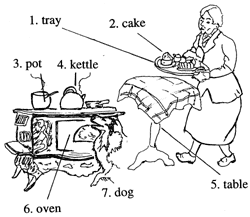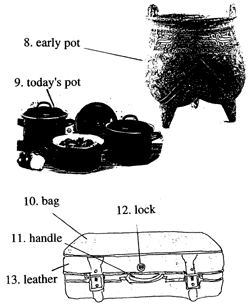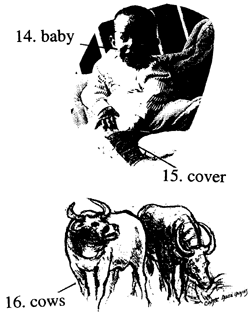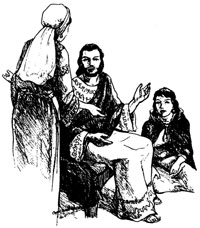Unit 17: The Imperative
命令
Pictured Words
描かれた単語
New Words
新しい単語

| 1. tray
皿 |
| 2. cake
ケーキ |
| 3. pot
鍋 |
| 4. kettle
やかん |
| 5. table
テーブル |
| 6. oven
オーブン |
| 7. dog
犬 |

| 8. early pot
早い鍋 |
| 9. today's pot
今日の鍋 |
| 10. bag
袋 |
| 11. handle
ハンドル |
| 12. lock
ロック |
| 13. leather
革 |

| 14. baby
赤ん坊 |
| 1 cover
カバー |
| 16. cows
牛 |
Nouns
名詞
動物
コック
経験
オイル
注意
心配
専門家
鍋
赤ん坊
条件
友人
理由
行動
細部
ハーモニー
要求
ビジネス
効果
損失
臭い
Adjectives
形容詞
完全- 分けなさい
正常
遅い
別
静寂
責任がある
偽
深刻
疲れた
Sayings
格言
The cook is putting her cakes on the table.
コックはテーブルに彼女をケーキ置いている。
Meat is cooking in the pot.
肉は鍋で調理している。
Early pots were designed for standing in the fire.
早い鍋は火に立つことのために設計されていた。
Big bags are necessary for a long journey.
大きい袋は長い旅行に必要である。
We put our coats on our backs, not in the bag.
私達は私達の背部に、ない袋に私達のコートを置いた。
The baby is smiling and very happy.
赤ん坊は非常に幸せ微笑して。
She can see cows outside the window.
彼女は窓の外の牛を見ることができる。
Cows are animals that must have grass frequently .
牛は草が頻繁になければならない動物である。
The Imperative
命令
In the two stories, "On a very hot day" and "The boy with the barley cakes and fish", our attention is got by giving orders.
非常に熱い日"および" オオムギを持つ男の子の2 つの物語では、"固まり、魚" は順序の提供によって、私達の注意得られる。
These orders are called the imperative of the verb.
これらの順序は動詞の命令と呼ばれる。
Examples are
例はある
he gave orders and said: take up your son.
彼は順序を与え、言った: あなたの息子をとなさい。
send for her.
彼女のために送りなさい。
do not say what is false.
偽であるものを言ってはいけない。
take him in to his mother.
彼の母に彼を連れて行きなさい。
send me one of the servants.
私に使用人の1 人を送りなさい。
let the people be seated.
人々を着席させることを許可しなさい。
take up the broken bits which are over.
ある壊れたビットをとなさい。
The simple verb is used without any changes.
簡単な動詞は変更なしで使用される。
This a way of giving force to the statement and giving it the sound of an order to the hearer.
これ力を声明に与え、聴衆にそれに順序の音を与える方法。
It may also be in the negative, as in the statement :
それはまた声明のように陰性に、あるかもしれない:
do not say what is false.
偽であるものを言ってはいけない。
The negatives of the above statements would have been:
上記の声明の陰性は次のとおりであろう:
he gave orders for the woman and said: do not take up your son
彼は女性のための発注を与え、言った: あなたの息子をとてはいけない
do not send for her.
彼女のために送ってはいけない。
do not take him to his mother.
彼の母に彼を連れて行ってはいけない。
do not send me one of the servants.
私に使用人の1 人を送ってはいけない。
do not let the people be seated.
人々を着席させることを許可してはいけない。
do not take up the broken bits which are over.
ある壊れたビットをとてはいけない。
In these forms the words “do not” are used to change the sense from positive to negative.
単語がこれらの形態で肯定的から陰性に感覚を変えるのに使用されている。
The verb "let" is quite usually used to say soft orders:
動詞はかなり柔らかい順序を言うのに使用されている"通常割り当てた":
let the people be seated.
人々を着席させることを許可しなさい。
It is still an imperative but it is a soft order.
それは命令まだであるが、柔らかい順序である。
Some examples from the story would be:
物語からの例は次のとおりである:
let the rest be for the needs of yourself and your sons.
残りがあなた自身及びあなたの息子の必要性のためであるようにしなさい。
let us make a little room on the wall.
私達を壁で少し部屋を作ることを許可しなさい。
let her be, for her soul is bitter in her.
彼女をあることを許可しなさいなぜなら彼女の精神は彼女で苦い。
The words "let us" only make a suggestion.
単語は提案をするためにだけ"私達が" 可能にした。

Two Sisters
2 人の姉妹
While they were on their way, he came to a certain town;
彼らが彼らの方法にある間、彼はある町に来た;
and a woman named Martha took him into her house.
そしてマーサと示された女性は彼女の家に彼を運んだ。
And she had a sister, by name Mary, who took her seat at the Lord's feet and gave attention to his words.
そして彼女に姉妹、名指しで主のフィートで彼女の座席を取り、彼の単語に注意を払ったメリーがいた。
But Martha had her hands full of the work of the house, and she came to him and said, Lord, is it nothing to you that my sister has let me do all the work?
しかしマーサに家の仕事の彼女の手が十分にあり、私の姉妹が仕事すべてをすることを許可した私を持っていること彼女来、主はあなたへ彼に、であるそれ何も言ったか。
say to her that she is to give me some help.
彼女が私に助けを与えるべきであること彼女への発言。
But the Lord, answering, said to her, Martha, Martha, you are full of care and troubled about such a number of things: Little is needed, or even one thing only: for Mary has taken that good part, which will not be taken from her.
しかし、言われる返事、マーサのの主彼女へのマーサ心配の完全、そのようないくつかの事について悩む: 少しは必要で、か均一な事1 つであるただ: メリーのために彼女から取られないそのよい部分を取った。
Additional Reading
付加的な読書
The two sisters were Mary and Martha, and they had a brother.
2 人の姉妹はメリー及びマーサであり、兄弟がいた。
His name was Lazarus.
彼の名前はLazarus だった。
You will have in mind that he was the one whom Jesus made to come back from the dead.
死者からもどって来るために作られるイエス・キリスト誰彼が1 才だったこと心で持っている。
Well, Jesus was going down to His own death at Jerusalem.
よく、イエス・キリストはエルサレムで彼自身の死に行っていた。
It says that in other parts of the story.
それは物語の他の部分のそれを言う。
So He was in effect making an attempt to get some peace and quiet in the house of His friends.
そう彼は事実上彼の友人の家の平和そして静寂を得る試みを作っていた。
He was always with a great number of people.
彼は多数の人々と常にあった。
Their desires and their needs always got His attention, so He was hardly ever left to Himself.
欲求および必要性は常に彼の関心を引いた、従って彼は彼自身にほとんど任せられなかった。
This was one house where Jesus' friends were, and there He could feel in harmony in His relations with others.
これはイエス・キリストの友人がいた、そこに彼は他の彼の関係のハーモニーで感じることができる1 軒の家であり。
Because they were His friends the two sisters had a strong desire to make Him feel very important.
彼らが彼の友人だったので2 人の姉妹に彼に感じを非常に重要にさせる強い欲求があった。
But the girls were different.
しかし女の子は異なっていた。
One of them said to herself, He needs food, I must feed Him.
彼女自身に言われるそれらの1 彼は食糧を、私彼に与えなければならない必要とする。
The other girl said to herself, He is tired, I must let Him talk.
彼女自身に言われる他の女の子彼は疲れている、私彼を話すことを許可しなければならない。
They had a different way of doing things.
それらは事をする別の方法を有した。
It was natural that Mary should sit and give attention.
メリーが注意を坐らせ、払うべきであることは自然だった。
We are told in another story that this was the Mary whom Jesus made free of seven devils.
これがイエス・キリストが7 人の悪魔の自由に作ったメリーだったこと私達に別の物語で言われる。
She was also the Mary who put sweet smelling oil on his feet.
彼女は彼のフィートに甘い臭いがするオイルを置いたメリーまただった。
She was a serious and sensitive person.
彼女は深刻で、敏感な人だった。
She had a feeling for his need for peace and quiet, so she gave attention to those needs.
彼女は平和及び静寂の彼の必要性のための感じを有した、従って彼女はそれらの必要性に注意を払った。
Martha, on the other hand, was a good woman in the house.
マーサは、一方では、家のよい女性だった。
It seemed to her that Jesus would need a big meal, so he would have the feeling of being looked after.
それは彼女にイエス・キリストが大きい食事を必要とする、従って彼は守られることの感じを有することにようである。
Now, it was a big business to get a Jewish meal.
今、それはユダヤ人の食事を得る大企業だった。
Pots had to be washed a certain way, religious ways had to be given every attention.
鍋は宗教方法あらゆる注意を払われなければならなかったある方法洗浄されなければならなかった。
Food had to be of a special nature and special care had to be taken with the washing of the hands.
食糧は特別な性質であり、特別な注意は手の洗浄と取られなければならなかった。
So we can see why Martha got the idea that her sister was not being responsible.
そう私達はマーサが彼女の姉妹が責任があっていなかった考えをなぜ得たか見ることができる。
Now-a-days we would say she was not doing her part.
この頃は私達は彼女が彼女の部分をしていなかったことを言う。
Or so it seemed to Martha.
またはそうそれはマーサにようである。
But, we see that both girls had their own way of behaviour when they put Jesus' needs first.
しかし、私達はイエス・キリストの必要性を最初に置いたときに女の子に両方とも行動の彼女達の自身の方法があったことを見る。
They were persons of a different nature.
彼らは別の性質のある人だった。
The one thing Jesus had in mind, though, was to have the experience of a happy time with His friends.
1 つの事イエス・キリストは心で、けれども、彼の友人との幸せな時間の経験を持つことだった持っていた。
He did not put any value on every detail.
彼はあらゆる細部に価値を置かなかった。
He had a different kind of help in mind.
彼は心で別の一種の助けを有した。
He came to their house for the experience of friendship and love.
彼は友情及び愛の経験のための家に来た。
As he said Himself, Little is needed and Mary has taken that good part.
彼はとして彼自身を言った、少しは必要であり、メリーはそのよい部分を取った。
Helpful Notes
有用なノート
| gave attention
注意を払った | the act of having thought for another.
別のもののために考えることの行為。 |
| harmony
ハーモニー | pleasant relations with others.
他の気持が良い関係。 |
| seven devils
7 人の悪魔 | a serious condition of a person's self control.
人の自己制御の深刻な状態。 |
| religious rites
宗教儀式 | the accepted ways of religion.
宗教の受け入れられた方法。 |
| Now-a-days
この頃は | at this time.
この時に。 |
| experience
経験 | the position one is in.
位置1 はある。 |